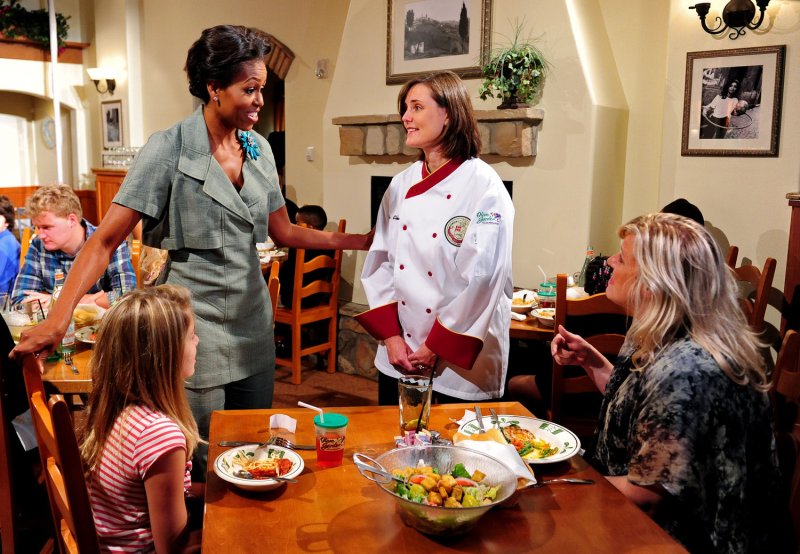A U.S. group is working with restaurants to help consumers wade through the trans fats and giant portion sizes in search of healthy alternatives. 2011 file photo of First lady Michelle Obama. UPI/Kevin Dietsch |
License Photo
A U.S. group is working with restaurants to help consumers wade through the trans fats and giant portion sizes in search of healthy alternatives.
The United States Healthful Food Council is a non-profit, non-governmental organization being developed by technology executive Lawrence Williams to help people make informed choices about where to spend their dining dollars.
The council will help to distinguish restaurants and other foodservice providers that are using nutrition best practices such as fresh, seasonal vegetables and fruits, whole grains, moderate portion sizes and minimally processed food and beverages with higher nutritional qualities, the group says on its Web site.
Williams said restaurants will also be recognized for decreasing their use of additives such as trans fats, sugar, sodium and monosodium glutamate.
Williams said the restaurant and foodservice industry has "unprecedented influence over the food choices and, consequently, the overall health of America."
Restaurants that meet certain criteria could be included on reservation and food review Web sites. Eventually, they could receive recognition similar to the Leadership in Energy and Environmental Design certification offered to buildings that meet green building standards.
"We want to be a trusted third party that matches diners with restaurants that are trying to do the right thing," he told UPI. "I think that this is something that is way overdue."
Williams says the group is not looking to compete with established organizations such as the Center for Science in the Public Interest, which is sometimes derided as the "food police" for their proclamations against fast food, movie popcorn and junk food.
"We're not here to shame anyone," he said, envisioning the group as more of a food cheerleader. He said the council intends to promote eating establishments that are doing the right things, and assist those that are not.
"We want (restaurants) to look at us as part of their marketing arm," he said. "We want to make serving healthy food good business."
Williams said he would like to see the council develop a program similar to the U.S. Green Building Council's LEED program, offering certification to restaurants that meet certain criteria. The start-up is also taking cues from the Environmental Working Group's Bottled Water Scorecard.
He said he plans to start with Washington and move into other urban markets, with the hope that it will eventually go nationwide.
"I'm convinced there is a need for this," he said.















